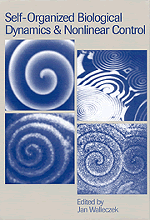 Self-Organized Biological Dynamics and Nonlinear Control
Self-Organized Biological Dynamics and Nonlinear Control Published online by Cambridge University Press: 14 August 2009
Background
As scientists unravel the secrets of the organization of life, an understanding of the temporal and spatiotemporal dynamics of biological processes is deemed crucial for creating a coherent, fully integrative picture of living organisms. In this endeavour, the basic challenge is to reveal how the coordinated, dynamical behavior of cells and tissues at the macroscopic level, emerges from the vast number of random molecular interactions at the microscopic level. This is the central task of modern biology and, traditionally, it has been tackled by focusing on the participating molecules and their microscopic properties, ultimately at the quantum level. Biologists often tacitly assume that once all the molecules have been identified, the complete functioning of the whole biological system can finally be derived from the sum of the individual molecular actions. This reductionistic approach has proven spectacularly successful in many areas of biological and medical research. As an example, the advances in molecular biology, which have led to the ability to manipulate DNA at the level of specific genes, will have a profound effect on the future course of medicine through the introduction of gene-based therapies. Despite this progress, however, the consensus is growing that the reductionist paradigm, by itself, may be too limiting for successfully dealing with fundamental questions such as (1) how living systems function as a whole, (2) how they transduce and process dynamical information, and (3) how they respond to external perturbations.
To save this book to your Kindle, first ensure [email protected] is added to your Approved Personal Document E-mail List under your Personal Document Settings on the Manage Your Content and Devices page of your Amazon account. Then enter the ‘name’ part of your Kindle email address below. Find out more about saving to your Kindle.
Note you can select to save to either the @free.kindle.com or @kindle.com variations. ‘@free.kindle.com’ emails are free but can only be saved to your device when it is connected to wi-fi. ‘@kindle.com’ emails can be delivered even when you are not connected to wi-fi, but note that service fees apply.
Find out more about the Kindle Personal Document Service.
To save content items to your account, please confirm that you agree to abide by our usage policies. If this is the first time you use this feature, you will be asked to authorise Cambridge Core to connect with your account. Find out more about saving content to Dropbox.
To save content items to your account, please confirm that you agree to abide by our usage policies. If this is the first time you use this feature, you will be asked to authorise Cambridge Core to connect with your account. Find out more about saving content to Google Drive.